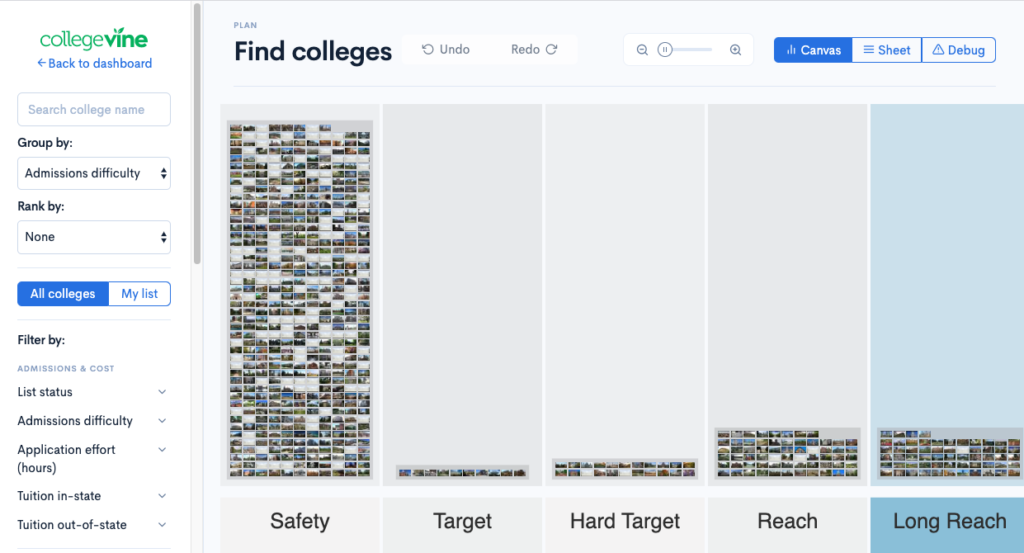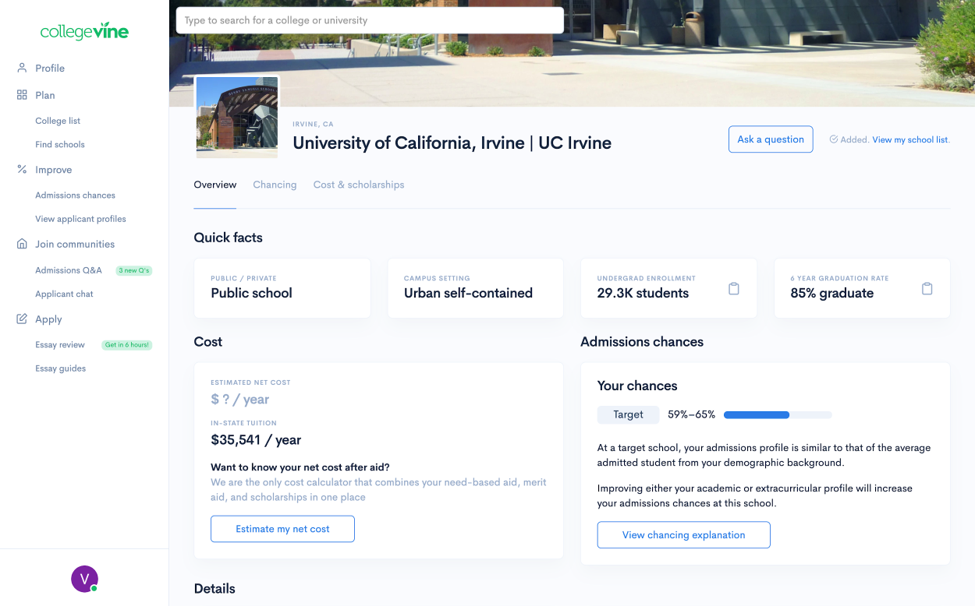Canceled College Visits: How to Research Colleges During Coronavirus
Businesses and organizations nationwide are closing to slow the spread of COVID-19, and colleges are no exception. While it’s good news that authorities are taking steps to protect lives, aspiring college students may feel confused about how to research or even decide on a college without ever visiting it. With colleges canceling campus visits and admitted student events, high schoolers will need to look to other sources. Keep reading for tips on how to research colleges during our current pandemic.
Canceled College Visits and Accepted Student Days
In the past, most colleges hosted Accepted Student Days, which allowed prospective students to visit (or revisit) the campus to experience the campus, meet faculty, and interact with fellow students. Although colleges are canceling in-person tours and activities this year to protect the public health, accepted students still have options when it comes to making admissions decisions. In fact, a number of institutions offer extensive online resources to aid with the selection process.
One of the best ways to get a feel for a college without setting foot on campus is to attend a virtual tour. These days, hundreds of schools offer free virtual tours showcasing the classrooms, dorms, and even facilities like cafeterias and gyms. For example, the University of North Carolina tour is available for free and shows the 16 campuses that make up the UNC System.
How to Research Colleges If You Can’t Visit
Seniors
If you still have questions after viewing campuses online, you can research schools by speaking to current and former students. For example, high school seniors can ask questions in Facebook groups set up for accepted students, such as “Harvard Class of 2024,” or even older accepted student groups, like the class of 2022.
Here are some other tips for evaluating colleges from afar:
Reach out to Alumni: You don’t have to attend an alumni event to network with a school’s graduates. Reach out to current and former students online to ask them questions about the college in general, or about a specific major you’re considering. In some cases, your school counselor may even be able to provide you with a list of alumni willing to chat about their experiences.
Look at Forums: Various websites host forums for current and prospective students to discuss their respective colleges. If you can’t visit your dream schools in person, take to websites like Reddit or College Confidential to connect with students who may have already visited the schools you’re interested in, or are currently attending those schools.
Check Out Vlogs and Blogs: If you prefer visual learning, visit YouTube to check out some official college videos featuring interviews with current students and professors. Additionally, you can view unofficial vlogs from students who attended—or opted not to attend—the school in question. Colleges may also run official student blogs, and you may also be able to find unofficial blogs where students of the college discuss their lifestyle and school experience.
Juniors
If you’re having trouble putting together a best-fit school list with canceled college visits, you can research schools using our free college admissions platform. Based on your profile, you’ll see which colleges are reach, target, and safety schools for you. You can also explore schools by other factors, such as admissions difficulty, tuition, class size, campus setting, and more.

On each school profile page, you’ll find information about the campus setting, housing, weather, diversity, and more. If you enter your financial information, you’ll also be able to see your estimated cost of attendance for each school.
For each school, we’ll also let you know your chances of acceptance, how you stack up against other applicants, and ways to improve your profile. Sign up for your free CollegeVine account today to start finding your dream school and building your college strategy!

Factors to Consider When Choosing a College
Choosing the right school involves more than dollars and cents. If you’re struggling to make acceptance decisions when you can’t visit colleges in person, start by considering this list of factors:
Politics and Culture: Choosing a college isn’t just about finding the right academic fit. You should also ensure the school you choose is a good fit both culturally and politically. Do your homework to determine whether the colleges you’re considering have the clubs and activities you enjoy. Additionally, you want to attend a school where you feel comfortable speaking your mind without fear of discrimination.
Career Support: With college debt on the rise, graduates need to find employment as soon as possible. When weighing different schools, consider what sort of job support is offered by various institutions. The best career centers help with internships, career planning, and more.
Study Abroad: Just because people are canceling their plane tickets now doesn’t mean they won’t be traveling again in the future. If you’re passionate about seeing the world during your college career, take time to consider your prospective schools’ study abroad programs. Along with ensuring the school has programs in your desired locales, you should inquire about credit transfers for your major of choice.
Other factors to weigh are: weather, professor-student interaction, availability of study spaces, ease of transport to other cities, academic support, cost of rent (if living off-campus), resources for low-income students, health services (including mental health), and many others.
What About Demonstrated Interest?
A soft quality in the admission process, demonstrated interest shows adcoms that you’re truly passionate about a school and likely to accept an offer to attend. As colleges cancel tours and other visits, high school juniors looking to get a jump on the application process may worry about their ability to show schools they care. Fortunately, there are other ways to prove you’re excited about the possibility of attending a specific college.
One of the best ways of showing passion is through your application answers and essays. Many colleges require a “Why This College” essay explaining why the institution in question is the perfect place to earn your degree; if you write a genuine and convincing essay, that will most certainly reflect well on your demonstrated interest. You can also sign up for the school’s mailing list, as colleges do keep track of who’s signed up and opening emails. In a few months, you may also be able to attend a tour, schedule an alumni interview, or meet with an admissions officer visiting your school, when social distancing is no longer a necessary precaution.
Finally, high school juniors can consider applying to one of the many schools that don’t consider demonstrated interest in admissions decisions. You might be surprised that there are more schools than you expected that give little weight (if any at all) to demonstrated interest.
These are difficult times for everyone. At CollegeVine, we’re here to support you. COVID-19 is a constantly-changing situation, and we want to ensure you have access to the most up-to-date info in one place. Visit our Coronavirus Info Center to check for any new developments in college admissions during these unusual circumstances.




